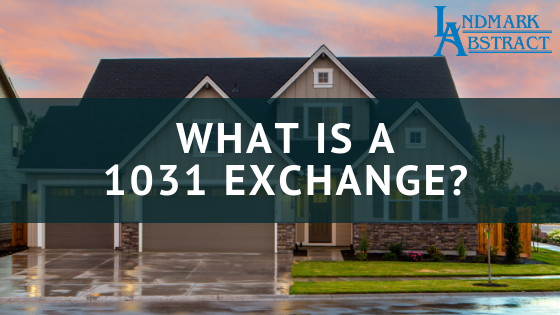Estimated reading time: 3 minutes

Overview
So, what is a 1031 exchange? When you sell an investment or income-producing property, you will be required to pay capital gains taxes on that sale. (The current capital gains rate is either 15 or 20 percent.) If you would like to use the proceeds from the sale to invest in replacement properties, you’ll find that the tax debt has reduced your buying power. In this situation, you should consider a 1031 exchange.
1031 Exchange Definition
A 1031 tax-deferred exchange allows owners of property held for productive use in a trade or business, or for investment, to defer capital gains by “exchanging” their property for another that is “like-kind.” All real estate in the US is like-kind and can be exchanged if they are used in business or held for income investment. For instance, you may exchange a rental home for a small commercial building, or a vacant lot for an apartment building. Your personal residence would not qualify.
Requirements
The IRS regulations provide for a Qualified Intermediary to properly document the exchange and maintain compliance with the rules. The exchange transaction is not much different from the traditional sale of one property and purchase of another. The exchange process is streamlined by the Intermediary, who sees that the funds are handled properly. The theory behind a 1031 exchange is that you have simply moved your investment from one property to another; therefore, all of the equity earned from the sale of your old property should be used toward the purchase of the new property.
Getting the Most Out Of The Transaction
To obtain the maximum tax deferral, the replacement property must be equal to or greater in value and equity than the relinquished property. Remember, too, that it is possible to exchange multiple properties within one 1031 transaction.
Timing
A 1031 transaction has strict time limits that must be followed. Potential replacement properties must be identified within 45 days of closing the sale of your relinquished property. Additionally, you have a total of 180 days from the close of the relinquished property sale to the close of the replacement property acquisition. The ability to defer taxes through a 1031 exchange is a powerful wealth-building tool. The professionals at Landmark Abstract can help you accomplish your goals.
Conclusion
Be sure to call Landmark Abstract at 717-293-9760 if you have any questions about a 1031 exchange want to start a transaction.


Leave a Reply
You must be logged in to post a comment.